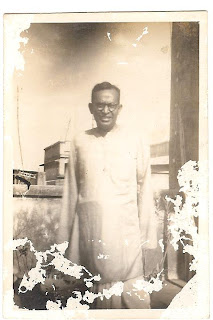Shri Bijon Kumar Sengupta, my grandfather, was of average height, had the trademark spectacles of the Bengali man of letters, although he had an MA in English and wrote an engaging prose in the language, he was never heard to speak anything but his mother tongue in the bangal dialect. So simple was this man, that one time, according to an oft repeated story of his youth, he had gone out wearing a raincoat because it was raining, and was seen returning still snugly ensconced in it although the sun was shining bright to everyone's amusement. He revealed later that he could not manage to open the raincoat when the rains stopped! This endearing, simple man spent 4 and a half years in various jails of the British Raj in the late 1930s. Even later, the British police had him under surveillance when he visited his in laws' place East Bengal. At the time of his arrest his rented tenement was surrounded and broken into. His wife, my grandmother was with child at that time....My grandfather saw his first born, my jethu, after 3years when my grandmother took him to visit his father in Presidency jail. Grandfather was released in the late '30s when the revolutionary movement in Bengal was in the wane due to severe repression by the British regime and untold suffering was endured by the families of the revolutionaries. My grandmother was lucky to get the support of her maternal uncles to tide her through the difficult times. There were 1000s of others who fought on, none the less.It was the sacrifice of these 'uncommon' common people that gave us our freedom.
This morning the Mr had put on the film 'Shaheed' on TV, the part on the fast in the jail for better conditions for the detainees was so moving. It spoke of the supreme power of sacrifice and a courageous adherence to principals. This was the strength of the youth of those times, otherwise how could they have striven towards such a seemingly impossible dream?
My grandmother never portrayed her husband as a hero, all the incidents related to him that she ever recounted pointed to and reinforced the fact that he was a simple man. Incidents of his arrest and of him being followed by the police during his visit to his inlaws' place were recounted in a matter of fact manner. It was for us to absorb these facts and realise, over time, how heroic and brave was this 'common' man and his family. How firmly he stood behind his principals, how tenacious was his perseverance, how selfless was his dedication to this nation. He had never sought any recognition or 'compensation'. Him and his kind have brought us our freedom. Our freedom must be celebrated for their sakes, our freedom is pure and blessed due to them. I salute all these 'uncommon' common people of this great nation.
This morning the Mr had put on the film 'Shaheed' on TV, the part on the fast in the jail for better conditions for the detainees was so moving. It spoke of the supreme power of sacrifice and a courageous adherence to principals. This was the strength of the youth of those times, otherwise how could they have striven towards such a seemingly impossible dream?
My grandmother never portrayed her husband as a hero, all the incidents related to him that she ever recounted pointed to and reinforced the fact that he was a simple man. Incidents of his arrest and of him being followed by the police during his visit to his inlaws' place were recounted in a matter of fact manner. It was for us to absorb these facts and realise, over time, how heroic and brave was this 'common' man and his family. How firmly he stood behind his principals, how tenacious was his perseverance, how selfless was his dedication to this nation. He had never sought any recognition or 'compensation'. Him and his kind have brought us our freedom. Our freedom must be celebrated for their sakes, our freedom is pure and blessed due to them. I salute all these 'uncommon' common people of this great nation.



